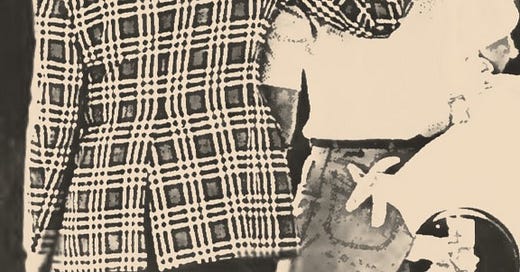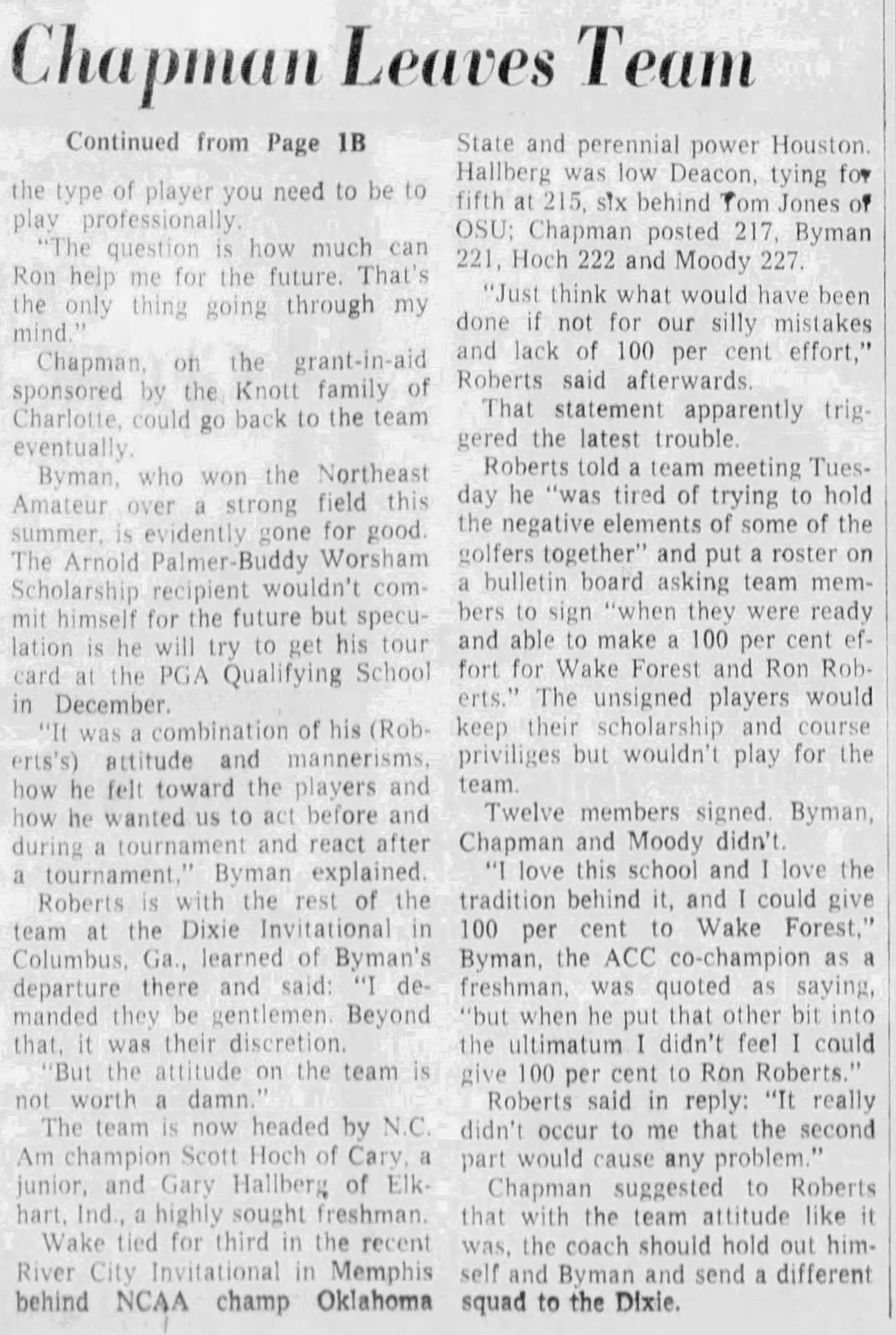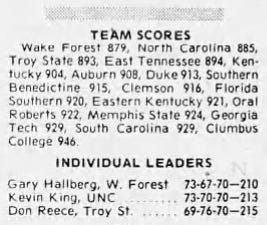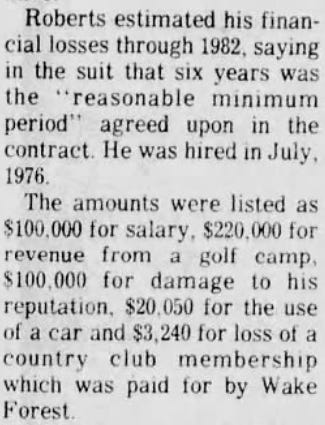Coaching Carousel: 1976-1977 (Part 2)
The Ripple Effects of Coach Haddock's 18 Months Away From Wake Forest
THE RIPPLE EFFECTS OF COACH HADDOCK’S 18 MONTHS AWAY FROM WAKE FOREST [1976-77]
Any time there is a coaching change it inevitably leads to cascading changes throughout the college golf world. Sometimes the number of schools affected is fairly small, but there are some instances where a single coaching change shakes up the course of history.
Some folks with either long memories or a curiosity for college golf history may know that Jesse Haddock briefly left Wake Forest after the 1976 NCAA championship only to return in the middle of the 1977-78 season. It was a relatively short blip over the course of his career, but those 18 months had a significant ripple effect that led to several interesting events across 5 different teams, affecting the career of two other Hall of Fame coaches, and heated discussions regarding career moves that resulted in one lawsuit and the threat of a second.
PART 2: THE RIDE STOPS AT WAKE FOREST
COACHING CHANGES
A recap of the coaching changes:
*NOTE: underlined text provides a link to references or sites with more information
1976 (summer):
Lost Coach Jesse Haddock
Hired Coach Ron Roberts
1977 (December):
Fired Coach Roberts
Hired Coach Haddock
1976 (summer):
Lost Coach Jack Higgins
Hired Coach Haddock
1976 (December):
Lost Coach Haddock
Hired Coach Bill Brogden
1976 (summer):
Lost Coach Roberts
Hired recent grad Buddy Alexander as “Interim Coach”
1976 (December-February 1977):
Lost Coach Brogden
Hired Coach Dave Sigler
1982-83:
Lost Coach Sigler
Hired Coach Buddy Alexander
1976 (December):
Hired former Assistant Coach (and player) Randy Hoffman
UNSTABLE TIMES AT WAKE FOREST
Roster Turnover
Several players left Wake Forest ahead of the 1976-77 season including seniors Jay Haas [1975 individual champ], David Thore, and Tim Saylor. Wake also lost Curtis Strange [1974 individual champ] to the pro ranks and Mark Tinder to Oral Roberts. Even after the player - and yes even coach - turnover the past year, Wake Forest was still in a strong position for the Fall with a powerful roster that included Bob Byman, Bill Chapman, Gary Hallberg, and Scott Hoch. The only question was, how would the players and their new coach get along?
Mark Whicker’s column in the Winston-Salem Journal when the news broke of Haddock’s leaving in July gave some indication:
“People talk about [Coach Haddock’s] golf,” Lewis says, “but he knew our swings so well that he could pick out flaws and correct them. He read a lot, and kept up with all the theories. His most important thing was psychological. He knew Leonard Thompson and I were different personalities. He could jump all over Leonard, but he knew to be a little more patient with me.” Chapman saw the same diversity in the way Haddock dealt with him and Strange.
“Curtis and Jay Haas were leaving, now Coach [Haddock],” mused Chapman. “I feel like Bob [Byman] and I are stuck in between. Maybe I’ll feel differently later, but right now I can’t look forward to next year very much. Things will be very different.”
River City Invitational
Both Coach Haddock and Coach Roberts set their sights on a difficult Fall 1976 schedule. Since both were looking to get into the same high caliber tournaments, this led to an early colliding of worlds as Wake Forest, Oral Roberts, and Georgia Southern all participated in the River City Invitational at the beginning of October in Memphis, TN.
The surprise of the tournament was first-round leader SMU, led by Coach Earl Stewart [1941 NCAA champ while at LSU] and a young Payne Stewart (no relation) who happened to get his first career hole-in-one as the Mustangs raced out to an early lead. Defending NCAA champs Oklahoma State, led by Coach Mike Holder (in his new 3 year contract), overcame what they described as a “lackadaisical attitude” to take both the team and individual titles (Tom Jones) in one of the strongest regular-season tournaments of the Fall. Wake Forest finished a respectable 3rd and Oral Roberts 9th, paced by a T2 finish by Art Utley. All in all, this seemed like a good start for Wake Forest, but trouble was brewing.
Frustrations Playing Out Publicly
Sometimes the scores don’t tell the whole story. That was the case after Wake’s first Fall tournament, which seemed ok, but clearly more was going on. Coach Roberts was doing his best in a tough situation - after all, nobody wants to be the guy that follows the legend - but perhaps he pushed a little too hard a little too early. Coach Holder could get away with calling his team’s performance “lackadaisical” but Coach Roberts expressing a similar sentiment wasn’t taken the same way. Unhappy with the comments and attitude coming from his players, Roberts made them sign a pledge to the school and to him as their coach. Apparently this was a step too far for some. When they refused to sign, Bob Byman, Bill Chapman, and Griff Moody found themselves “temporarily” off the team. The latter two would eventually return later in the season, but Byman took the opportunity to turn pro. The situation was ugly to say the least, made worse by how public it became.
All-Dixie Intercollegiate
Less than a week after the River City Intercollegiate in Memphis, Wake Forest and Oral Roberts met again, this time in the All-Dixie Intercollegiate played out at Bull Creek in Columbus, GA. Wake Forest was the three-time defending champs and looked the part with a six stroke victory over UNC while Oral Roberts could only muster an 11th place finish. Despite Byman, Chapman, and Moody not being in the lineup, Wake Forest still had great players like Gary Hallberg, who took medalist honors thanks in part to a course record-tying 67 in the second round. Perhaps the ride was stabilizing?
Rest of the Regular Season
Wake Forest’s final tournament of the Fall was at the Duke Invitational in early November. Despite Bill Chapman’s return to the lineup and winning medalist honors, the cold weather (wind-chill factor of 17 degrees!) and NC State’s charge up the leaderboard ultimately got to the Demon Deacons who finished 2nd by two shots. As a team, Wake Forest finished 3rd, 1st, and 2nd in their three tournaments that Fall - with two individual victories - but based on the attitude coming from newspaper columnists and the clearly annoyed responses from Coach Roberts, you’d think Wake had finished last in every tournament.
“Sure, it’s been a hassle, but it’s like any other transition. The one thing I don’t want to get into is a comparison. Nobody wins that way.”
“I remember Wake Forest went undefeated last season and finished fourth in the NCAA. Oklahoma State lost four or five tournament and won the NCAA. I would have rather had Oklahoma State’s year than Wake Forest’s.”
-Coach Roberts quoted in Winston-Salem Journal (13 Nov 1976)
The ground thawed and the weather warmed in the Spring of 1977, so too did the frosty feelings around the Wake Forest golf program dissipate...at least for a while. By the end of February, before the first Spring tournaments began, news reports were sounding hopeful again. Chapman was quoted in the Winston-Salem Journal saying
“I’m really impressed with the way Ron runs things. He’s very organized and knows exactly what he wants us to do. I’ve learned a lot.”
Clearly he did as he took medalist honors in the first tournament of the Spring, the Pinehurst Intercollegiate. The next week at the Palmetto Intercollegiate, it was Hallberg’s turn to take medalist honors as Wake won its first Spring tournament. At this point, it was Coach Roberts trying to temper expectations.
Turns out it was warranted. Although Hallberg won medalist honors for the second tournament in a row at the Iron Duke, Wake Forest slipped to a disappointing 4th behind ACC rivals NC State and UNC (as well as Marshall). The next several tournaments to close out the regular season were marked with the words “mediocre” and “inconsistent.”
Wake Forest Fails to Retain ACC Title
The last time a coach other than Jesse Haddock left the ACC championship with the team title was Ellis “Dumpy” Hagler’s 1966 Duke team. The year before that, UNC won their only ACC title under Coach Ed Kennedy. Now, twelve years later, UNC won their only ACC title under Coach Mike McLeod.
Wake Forest’s 10 year reign ending wasn’t a huge surprise, but the play by Hallberg and Chapman down the stretch was. The only way to describe it was mediocre and inconsistent. The Demon Deacons slipped to third, 14 strokes behind UNC and 12 behind Maryland. Even still, it was Scott Hoch who earned medalist honors, making him the 19th Wake Forest golfer to win the ACC individual title in 24 years. Reading the post-round quotes, however, shows how hollow the victory felt without the team success.
Schenkel Intercollegiate
Putting a nice poetic bow on the season, the last remaining challenge before the NCAA championship was the Chris Schenkel Intercollegiate, hosted by Georgia Southern and generally regarded as one of the top tournaments in the southeast region. Wake Forest looked good in the first rounds, but ultimately finished T4 behind Georgia who ran away from the field thanks in large part to individual medalist Jim Becker who opened his final round 65 with a front-nine 29. Coach Alexander’s squad finished 2nd, 12 shots behind the Bulldogs and 4 shots ahead of the Demon Deacons.
1977 NCAA Championship
The 80th men’s college golf championship was played at Colgate University’s Seven Oaks GC in Hamilton, NY. Wake Forest nearly missed it. Because the selections were made at the time based on districts/regions, there were approximately 7 team slots available from the ACC/SEC/SoCon/Southern Independents area, and Wake Forest was one of a dozen or so in the mix.
Thanks in part to how the SEC championship played out which narrowed the teams in consideration, Wake did get the invite, but had no idea how they would fare:
“My whole attitude toward the tournament is to get up there and let it happen. We’ve been so inconsistent, I have no idea what to expect. I’m going prepared to finish anywhere from 15th to first.”
Coach Roberts in Winston-Salem Journal (5 June 1977)
One note about the championship, it was the last to use the 5-count-4 **aggregate format where the team score was determined at the end (or cut point) rather than daily as is customary for all regular and post-season collegiate golf tournaments today. Even the next year’s format wouldn’t have helped Wake Forest - whose 1975 victory is reported to be the impetus for the change in the first place - in their disappointing but not unexpected 10th place finish. The championship was nearly a repeat of the 1976 edition as USC’s Scott Simpson retained his individual title, but Oklahoma State fell to Coach Dave Williams’ Houston Cougars.
ONE LAST TURN: COACH HADDOCK RETURNS TO WAKE FOREST [ DEC 1977]
Fall 1977-78 Season
“I think there is a lot more faith in Coach Roberts this year. Last year, everybody was looking for an excuse for why we were losing. We were always pessimistic. There’s so much more trust now.”
Gary Pinns, Wake Forest sophomore transfer from Georgia Southern (The Sentinel, 05 Oct 1977)
Coach Roberts’ second season at the helm of the Wake Forest golf program started well. His group was young, mostly freshmen he had recruited and sophomores, but they showed early promise with a team victory in the Foxfire All-American Classic. The second tournament was the all-important River City Intercollegiate. Facing one of the toughest tests all season much less just in the Fall, Wake Forest came in second, beating out reigning NCAA champ Houston.
Things appeared to be trending in a great direction, however that came crashing down in the third and final Fall tournament. Wake Forest players again appeared mediocre and inconsistent, finishing 11th in the Cypress Gardens/Grenelefe Invitational, well behind team champ Georgia Southern. It was an unfortunate way to end the Fall, but things were about to get much more unpleasant.
Haddock Returns to Winston-Salem
Around the time that Coach Roberts and the Wake Forest squad were braving the chilly New York summer in the 1977 championship, Jesse Haddock was returning home to Winston-Salem to figure out what he wanted to do next. The first-year sports management group he left Oral Roberts for had become insolvent, and now Haddock had to decide if he wanted to get back into coaching somewhere or get out of golf entirely. He apparently chose the latter as he was hooked up with a pharmaceutical sales job by a Wake alumnus. Perhaps he knew something was on the horizon and was just waiting in the wings.
Whispers of a potential return began making the rounds in public print around September, along with details that Roberts might have threatened a lawsuit if he were dropped by Wake. In early December, after the conclusion of the Fall 1977-78 season, headlines in the local papers announced Jesse Haddock had been rehired as Wake Forest’s golf coach and that Ron Roberts would be reassigned to administrative duties. One big problem for anyone celebrating Haddock’s return: instead of the planned press conference announcement, the next day brought conflicting reports under the headline “Roberts: ‘I Am Still Wake’s Golf Coach.” It seems that Roberts had no intention of relinquishing his head coaching role, and as he was quoted in the Winston-Salem Journal (04 Dec 1977):
“I came here to coach golf and it was agreed that this would be my primary responsibility.”
Despite his protestations otherwise, Roberts was done coaching golf at Wake and his refusal to take any other position meant that his time at the university had come to an end.
Ron Roberts Files Lawsuit Against Wake Forest
Newspaper sports columnists in North Carolina spent more time (and ink) than they had likely anticipated writing about college golf that holiday season. On the one hand there was joy at having the future hall of fame coach back in the fold; on the other, a sour feeling for the departing coach that was rather unceremoniously shoved out the door. As one writer for The Sentinel put it:
The circumstances of his return leave a lot to be desired, but it’s good to have Jess Haddock back at Wake.
Ron Roberts, however, didn’t deserve the shabby treatment he got from the administration. Ron is straightforward, thoroughly organized and very intelligent. He didn’t pamper the golfers and so they didn’t love him. But Ron did his job well and he will go far in this world.
What was missing from the newspapers, however, was any real statements from Roberts regarding the matter. In mid-January, 1978, those statements finally came and they are as meticulous and thorough as you’d expect from a man often described as being highly organized. A substantial portion of the nine-page statement was printed in the 17 Jan 1978 edition of the Winston-Salem Journal:
The details Coach Roberts outlined in his statement formed the basis for an eventual $443,2901 lawsuit he filed against the University for breach of contract with his untimely termination. It would be another four years - ultimately around the time Roberts had expected his minimum coaching career to last at Wake - before that matter was eventually settled and the appeals rejected. In the end the courts sided with the defendants in the matter of ROBERTS V. WAKE FOREST UNIVERSITY with the following opinion:
In conclusion, we find that plaintiff’s discharge as Golf Coach, with or without cause, did not constitute a breach of contract, and summary judgement for the defendant is Affirmed.
Many of Roberts’ claims in his expansive statement were not a part of the legal matter, but were nonetheless significant. Those same North Carolina newspapers printed dozens of articles over the first couple of months in 1978 discussing the merits of the claims, rebuttal from various people mentioned (both by name and indirectly), and even compiled a list of Haddock’s past players to examine the true graduation rate from Wake Forest over time. Perhaps, despite the success on the course, there had been a culture problem that Coach Haddock would need to address going forward.
Afterwards
Wake Forest’s Spring 1977-78 season wasn’t a complete return to dominant form, but they got out to a hot start and even recaptured the ACC team title which they would hold onto for the next 3 years. That Wake Forest “mystique” was back and the mood was good.
Ironically, Oral Roberts and Wake Forest would finish within one stroke of each other in the 1978 NCAA championship at Eugene CC (OR), with Coach Brogden’s Titans edging out Coach Haddock’s Demon Deacons for an impressive 6th place finish. The 1979 NCAA championship was hosted by Wake Forest at Bermuda Run CC, thanks to the petition made by Coach Roberts in early 1977. Despite the home course advantage and seeming return to top form - led by individual champion Gary Hallberg - Wake Forest finished 3rd behind Ohio State and Oklahoma State. Oral Roberts again finished 6th.
The 1979-80 season was a true turning point for Oral Roberts; they would finish 3rd in the 1980 championship, just five strokes back of Oklahoma State, and then runner-up in the 1981 championship, a mere two strokes behind BYU.
Wake Forest would continue to make regular appearances at the NCAA championships throughout the 1980s, breaking through at the 1986 championship (again hosted by Wake Forest at Bermuda Run CC) for the last of Coach Haddock’s three NCAA team titles. He won his final ACC team title in 1989, bringing his final total to a conference-record 15.
Who knows what might have happened if Coach Haddock and Wake Forest had come to a last-minute resolution the way Coach Holder and Oklahoma State did. One thing is for certain, though, those 18-months between Haddock leaving and returning to Wake Forest had an incredible impact on the entire college golf world!














